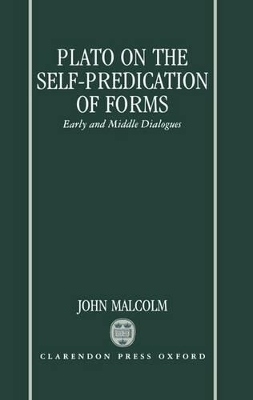
Plato on the Self-Predication of Forms
Early and Middle Dialogues
Seiten
1991
Clarendon Press (Verlag)
978-0-19-823906-2 (ISBN)
Clarendon Press (Verlag)
978-0-19-823906-2 (ISBN)
An interpretation of Plato's earlier dialogues which argues that the few cases of self-predication contained therein are acceptable simply as statements concerning universals and that therefore Plato is not vulnerable in these cases to the "third man argument".
Much of the recent literature published on Plato's metaphysics has involved the Third Man Argument found in his dialogue Parmenides. This argument depends upon construing Forms both as universals and as paradigm examples, and thus as being subject to self-predication.
Professor Malcolm first presents a new and radical interpretation of Plato's earlier dialogues. He argues that the few cases of self-predication contained therein are acceptable simply as statements concerning universals (for example, `beauty is beautiful'), and that therefore Plato is not vulnerable in these cases to the Third Man Argument.
In considering the middle dialogues, Professor Malcolm takes a conservative stance, rejecting influential current doctrines which portray the Forms as being not self-predicative. He shows that the middle dialogues do indeed take Forms to be both universals and paradigms, and thus to exemplify themselves. The author goes on to consider why Plato should have been unsuccessful in avoiding self-predication. He shows that Plato's concern to explain how the truths of mathematics can indeed be true played an important role in his postulation of the Form as an Ideal Individual. The author concludes with the claim that reflection on the ambiguity of such notions as the `Standard Yard' may help us to appreciate why Plato failed to distinguish Forms as universals from Forms as paradigm cases.
Much of the recent literature published on Plato's metaphysics has involved the Third Man Argument found in his dialogue Parmenides. This argument depends upon construing Forms both as universals and as paradigm examples, and thus as being subject to self-predication.
Professor Malcolm first presents a new and radical interpretation of Plato's earlier dialogues. He argues that the few cases of self-predication contained therein are acceptable simply as statements concerning universals (for example, `beauty is beautiful'), and that therefore Plato is not vulnerable in these cases to the Third Man Argument.
In considering the middle dialogues, Professor Malcolm takes a conservative stance, rejecting influential current doctrines which portray the Forms as being not self-predicative. He shows that the middle dialogues do indeed take Forms to be both universals and paradigms, and thus to exemplify themselves. The author goes on to consider why Plato should have been unsuccessful in avoiding self-predication. He shows that Plato's concern to explain how the truths of mathematics can indeed be true played an important role in his postulation of the Form as an Ideal Individual. The author concludes with the claim that reflection on the ambiguity of such notions as the `Standard Yard' may help us to appreciate why Plato failed to distinguish Forms as universals from Forms as paradigm cases.
The extent of self-predication in the earlier dialogues; self-predication in the "Hippias Major" and the "Protagoras"; the "third man"; the middle-dialogue forms are universals; the rejection of the doctrine that the form is not an F Thing; the form as an F Thing non-univocally with the F Particulars; the form as an F Thing univocally with the F Particulars; logico-linguistic error as the genesis of the paradigm case; three more likely sources for the paradigm case; the failure to distinguish the universal from the paradigm case.
| Erscheint lt. Verlag | 27.6.1991 |
|---|---|
| Verlagsort | Oxford |
| Sprache | englisch |
| Maße | 144 x 224 mm |
| Gewicht | 442 g |
| Themenwelt | Geisteswissenschaften ► Philosophie ► Metaphysik / Ontologie |
| Geisteswissenschaften ► Philosophie ► Philosophie Altertum / Antike | |
| ISBN-10 | 0-19-823906-8 / 0198239068 |
| ISBN-13 | 978-0-19-823906-2 / 9780198239062 |
| Zustand | Neuware |
| Informationen gemäß Produktsicherheitsverordnung (GPSR) | |
| Haben Sie eine Frage zum Produkt? |
Mehr entdecken
aus dem Bereich
aus dem Bereich
eine philosophische Reise
Buch | Softcover (2024)
Goldmann (Verlag)
CHF 19,55
Auf dem Weg zu einer postkritischen Philosophie
Buch | Softcover (2023)
Suhrkamp (Verlag)
CHF 53,20


